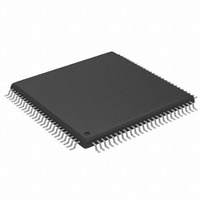XC3S100E-4VQG100I Xilinx Inc, XC3S100E-4VQG100I Datasheet - Page 100

XC3S100E-4VQG100I
Manufacturer Part Number
XC3S100E-4VQG100I
Description
FPGA Spartan®-3E Family 100K Gates 2160 Cells 572MHz 90nm (CMOS) Technology 1.2V 100-Pin VTQFP
Manufacturer
Xilinx Inc
Series
Spartan™-3Er
Datasheet
1.XC3S100E-4VQG100C.pdf
(233 pages)
Specifications of XC3S100E-4VQG100I
Package
100VTQFP
Family Name
Spartan®-3E
Device Logic Cells
2160
Device Logic Units
240
Device System Gates
100000
Number Of Registers
1920
Maximum Internal Frequency
572 MHz
Typical Operating Supply Voltage
1.2 V
Maximum Number Of User I/os
66
Ram Bits
73728
Number Of Logic Elements/cells
2160
Number Of Labs/clbs
240
Total Ram Bits
73728
Number Of I /o
66
Number Of Gates
100000
Voltage - Supply
1.14 V ~ 1.26 V
Mounting Type
Surface Mount
Operating Temperature
-40°C ~ 100°C
Package / Case
100-TQFP
Lead Free Status / RoHS Status
Lead free / RoHS Compliant
Available stocks
Company
Part Number
Manufacturer
Quantity
Price
Company:
Part Number:
XC3S100E-4VQG100I
Manufacturer:
XILINX
Quantity:
2 100
Company:
Part Number:
XC3S100E-4VQG100I
Manufacturer:
Xilinx Inc
Quantity:
10 000
- Current page: 100 of 233
- Download datasheet (6Mb)
Functional Description
Table 66: Slave Serial Mode Connections
100
HSWAP
M[2:0]
DIN
CCLK
INIT_B
DONE
PROG_B
Pin Name
FPGA Direction
bidirectional I/O
bidirectional I/O
Open-drain
Open-drain
Input
Input
Input
Input
Input
User I/O Pull-Up Control. When
Low during configuration, enables
pull-up resistors in all I/O pins to
respective I/O bank
0: Pull-up during configuration
1: No pull-ups
Mode Select. Selects the FPGA
configuration mode. See
Considerations for the HSWAP,
M[2:0], and VS[2:0]
Data Input.
Configuration Clock. If CCLK
PCB trace is long or has multiple
connections, terminate this output
to maintain signal integrity. See
CCLK Design
Initialization Indicator. Active
Low. Goes Low at start of
configuration during Initialization
memory clearing process.
Released at end of memory
clearing, when mode select pins
are sampled. In daisy-chain
applications, this signal requires
an external 4.7 kΩ pull-up resistor
to VCCO_2.
FPGA Configuration Done. Low
during configuration. Goes High
when FPGA successfully
completes configuration.
Requires external 330 Ω pull-up
resistor to 2.5V.
Program FPGA. Active Low.
When asserted Low for 500 ns or
longer, forces the FPGA to restart
its configuration process by
clearing configuration memory
and resetting the DONE and
INIT_B pins once PROG_B
returns High. Recommend
external 4.7 kΩ pull-up resistor to
2.5V. Internal pull-up value may
be weaker (see
driving externally with a 3.3V
output, use an open-drain or
open-collector driver or use a
current limiting series resistor.
Description
Considerations.
Table
V
Pins.
CCO
78). If
www.xilinx.com
Design
input.
Drive at valid logic level
throughout configuration.
M2 = 1, M1 = 1, M0 = 1 Sampled
when INIT_B goes High.
Serial data provided by host.
FPGA captures data on rising
CCLK edge.
External clock.
Active during configuration. If
CRC error detected during
configuration, FPGA drives
INIT_B Low.
Low indicates that the FPGA is
not yet configured.
Must be High to allow
configuration to start.
During Configuration
DS312-2 (v3.8) August 26, 2009
User I/O
User I/O
User I/O
User I/O
User I/O. If unused in the
application, drive INIT_B
High.
Pulled High via external
pull-up. When High,
indicates that the FPGA
successfully configured.
Drive PROG_B Low and
release to reprogram
FPGA.
After Configuration
Product Specification
R
Related parts for XC3S100E-4VQG100I
Image
Part Number
Description
Manufacturer
Datasheet
Request
R

Part Number:
Description:
IC SPARTAN-3E FPGA 100K 144-TQFP
Manufacturer:
Xilinx Inc
Datasheet:

Part Number:
Description:
IC FPGA SPARTAN-3E 100K 144-TQFP
Manufacturer:
Xilinx Inc
Datasheet:

Part Number:
Description:
FIELD PROGRAMMER
Manufacturer:
Xilinx Inc
Datasheet:

Part Number:
Description:
FPGA Spartan®-3E Family 100K Gates 2160 Cells 572MHz 90nm (CMOS) Technology 1.2V 144-Pin TQFP
Manufacturer:
Xilinx Inc
Datasheet:

Part Number:
Description:
FPGA Spartan®-3E Family 100K Gates 2160 Cells 657MHz 90nm (CMOS) Technology 1.2V 144-Pin TQFP
Manufacturer:
Xilinx Inc
Datasheet:

Part Number:
Description:
Spartan-3E FPGA Family
Manufacturer:
XILINX [Xilinx, Inc]
Datasheet:

Part Number:
Description:
Spartan-3E FPGA Family: Complete Data Sheet
Manufacturer:
XILINX [Xilinx, Inc]
Datasheet:

Part Number:
Description:
IC FPGA SPARTAN-3E 100K 100-VQFP
Manufacturer:
Xilinx Inc
Datasheet:

Part Number:
Description:
IC FPGA SPARTAN-3E 100K 132CSBGA
Manufacturer:
Xilinx Inc
Datasheet:

Part Number:
Description:
IC FPGA SPARTAN-3E 100K 132CSBGA
Manufacturer:
Xilinx Inc
Datasheet:

Part Number:
Description:
IC FPGA SPARTAN-3E 100K 144-TQFP
Manufacturer:
Xilinx Inc
Datasheet:

Part Number:
Description:
IC FPGA SPARTAN 3E 100VQFP
Manufacturer:
Xilinx Inc
Datasheet:

Part Number:
Description:
IC FPGA SPARTAN 3E 144TQFP
Manufacturer:
Xilinx Inc
Datasheet:

Part Number:
Description:
FPGA Spartan®-3E Family 100K Gates 2160 Cells 572MHz 90nm (CMOS) Technology 1.2V 132-Pin CSBGA
Manufacturer:
Xilinx Inc
Datasheet:

Part Number:
Description:
IC CPLD .8K 36MCELL 44-VQFP
Manufacturer:
Xilinx Inc
Datasheet:











